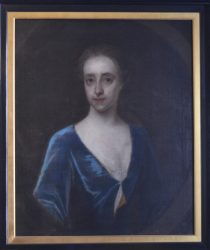
Marianne Peloquin (1706-1778)
c. 1814
Oil on Canvas, Frame- wood painted blank with gilt border around portrait
Unknown artist, copy after John Wollaston, the Younger (1710-1775)
JJ.1980.99
Marianne Peloquin was born to Francoise and Stephen Peloquin in 1706. She was the youngest of four children, she had two brothers (John and David) as well as a sister, Nancy. Her mother, Francoise, was the sister of Auguste Jay, John Jay’s grandfather. After Louis XIV revoked the Edict of Nantes in 1685, many French Huguenots left their homeland and sought refuge in Protestant countries. Many, like Auguste, made their way to the colonies but others, like the Peloquins, went to England instead. Despite this, the Peloquins remained in contact with their Jay relatives in the colonies/United States.
Though little is known about Marianne Peloquin, we do know she never married and later inherited about $80,000 (or about $3.4 million in today’s money) from her brother David. She donated $19,000 of this inheritance to help the poor of England, and that charity still bears her name to this day.
In a letter written by John Jay’s father, Peter, to his aunt Francoise Peloquin in 1726, he laments that he is unable to see her often but finds comfort in the images of her and the family. While the letter does not explicitly mention Marianne’s own portrait, it does reference the “other family members so dear”, possibly indicating her image as well.
In another set of letters from John Jay to his son Peter Augustus Jay, he asks that Peter Augustus find an artist to make copies of the portraits of several family members including, “Mrs. Peloquin”. He made sure to note that he wanted the portraits to be done well and not cheaply. In a letter dated from April 1814, Jay approved of Peter Augustus’ choice of artist, even though he had reservations. While we don’t know for sure who the artist of this copy was, Jay gives a slight clue when he tells Peter Augustus, “If the goodness of Waldo’s copies should be in proportion to his price, I shall wish it had been higher- I approve of your reasons for employing him”. It is possible that he was referring to Samuel Lovett Waldo, an American portraitist born in Connecticut who was a contemporary of John Trumbull and associate of Benjamin West as well as John Singleton Copley.
You may view the Object of the Day Archives HERE
